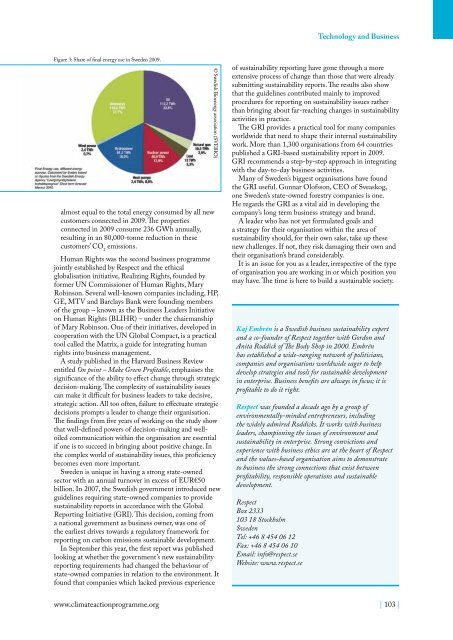Climate Action 2010-2011
Create successful ePaper yourself
Turn your PDF publications into a flip-book with our unique Google optimized e-Paper software.
Technology and Business<br />
Figure 3: Share of final energy use in Sweden 2009.<br />
almost equal to the total energy consumed by all new<br />
customers connected in 2009. The properties<br />
connected in 2009 consume 236 GWh annually,<br />
resulting in an 80,000-tonne reduction in these<br />
customers’ CO 2<br />
emissions.<br />
Human Rights was the second business programme<br />
jointly established by Respect and the ethical<br />
globalisation initiative, Realizing Rights, founded by<br />
former UN Commissioner of Human Rights, Mary<br />
Robinson. Several well-known companies including, HP,<br />
GE, MTV and Barclays Bank were founding members<br />
of the group – known as the Business Leaders Initiative<br />
on Human Rights (BLIHR) – under the chairmanship<br />
of Mary Robinson. One of their initiatives, developed in<br />
cooperation with the UN Global Compact, is a practical<br />
tool called the Matrix, a guide for integrating human<br />
rights into business management.<br />
A study published in the Harvard Business Review<br />
entitled On point – Make Green Profitable, emphasises the<br />
significance of the ability to effect change through strategic<br />
decision-making. The complexity of sustainability issues<br />
can make it difficult for business leaders to take decisive,<br />
strategic action. All too often, failure to effectuate strategic<br />
decisions prompts a leader to change their organisation.<br />
The findings from five years of working on the study show<br />
that well-defined powers of decision-making and welloiled<br />
communication within the organisation are essential<br />
if one is to succeed in bringing about positive change. In<br />
the complex world of sustainability issues, this proficiency<br />
becomes even more important.<br />
Sweden is unique in having a strong state-owned<br />
sector with an annual turnover in excess of EUR€50<br />
billion. In 2007, the Swedish government introduced new<br />
guidelines requiring state-owned companies to provide<br />
sustainability reports in accordance with the Global<br />
Reporting Initiative (GRI). This decision, coming from<br />
a national government as business owner, was one of<br />
the earliest drives towards a regulatory framework for<br />
reporting on carbon emissions sustainable development.<br />
In September this year, the first report was published<br />
looking at whether the government’s new sustainability<br />
reporting requirements had changed the behaviour of<br />
state-owned companies in relation to the environment. It<br />
found that companies which lacked previous experience<br />
© Swedish Bioenergy association (SVEBIO)<br />
of sustainability reporting have gone through a more<br />
extensive process of change than those that were already<br />
submitting sustainability reports. The results also show<br />
that the guidelines contributed mainly to improved<br />
procedures for reporting on sustainability issues rather<br />
than bringing about far-reaching changes in sustainability<br />
activities in practice.<br />
The GRI provides a practical tool for many companies<br />
worldwide that need to shape their internal sustainability<br />
work. More than 1,300 organisations from 64 countries<br />
published a GRI-based sustainability report in 2009.<br />
GRI recommends a step-by-step approach in integrating<br />
with the day-to-day business activities.<br />
Many of Sweden’s biggest organisations have found<br />
the GRI useful. Gunnar Olofsson, CEO of Sveaskog,<br />
one Sweden’s state-owned forestry companies is one.<br />
He regards the GRI as a vital aid in developing the<br />
company’s long term business strategy and brand.<br />
A leader who has not yet formulated goals and<br />
a strategy for their organisation within the area of<br />
sustainability should, for their own sake, take up these<br />
new challenges. If not, they risk damaging their own and<br />
their organisation’s brand considerably.<br />
It is an issue for you as a leader, irrespective of the type<br />
of organisation you are working in or which position you<br />
may have. The time is here to build a sustainable society.<br />
Kaj Embrén is a Swedish business sustainability expert<br />
and a co-founder of Respect together with Gordon and<br />
Anita Roddick of The Body Shop in 2000. Embrén<br />
has established a wide-ranging network of politicians,<br />
companies and organisations worldwide eager to help<br />
develop strategies and tools for sustainable development<br />
in enterprise. Business benefits are always in focus; it is<br />
profitable to do it right.<br />
Respect was founded a decade ago by a group of<br />
environmentally-minded entrepreneurs, including<br />
the widely admired Roddicks. It works with business<br />
leaders, championing the issues of environment and<br />
sustainability in enterprise. Strong convictions and<br />
experience with business ethics are at the heart of Respect<br />
and the values-based organisation aims to demonstrate<br />
to business the strong connections that exist between<br />
profitability, responsible operations and sustainable<br />
development.<br />
Respect<br />
Box 2333<br />
103 18 Stockholm<br />
Sweden<br />
Tel: +46 8 454 06 12<br />
Fax: +46 8 454 06 10<br />
Email: info@respect.se<br />
Website: www.respect.se<br />
www.climateactionprogramme.org | 103 |












